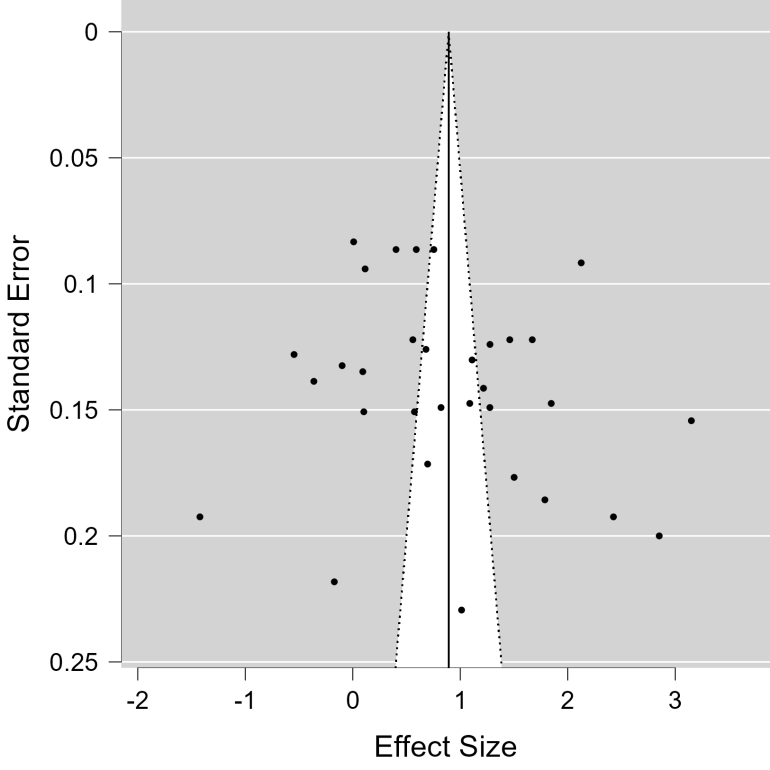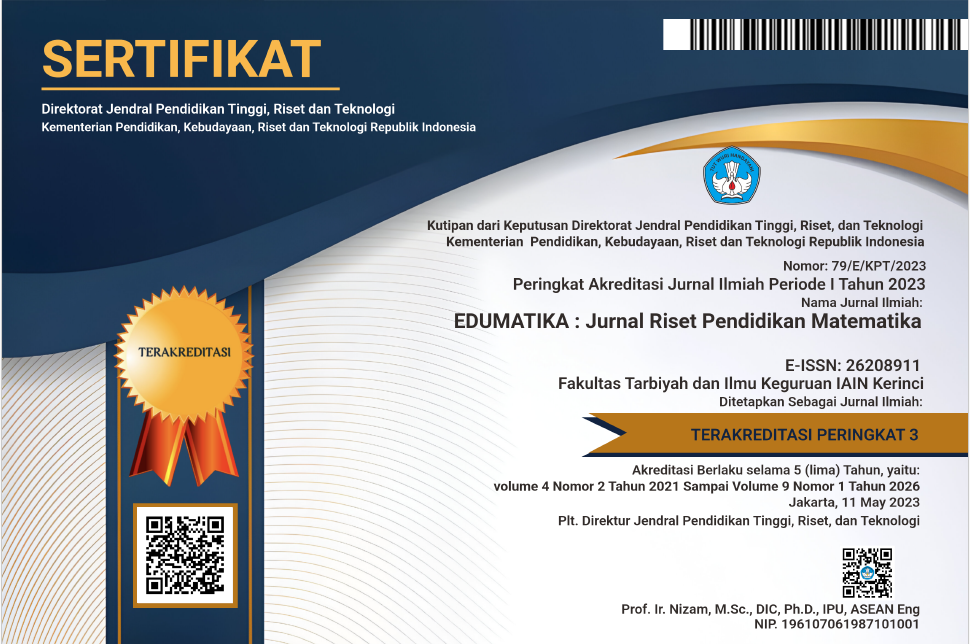Meta-Analysis: The Effect of Project-Based Learning toward Mathematical Concepts Understanding in Term of Learning Media Utilization
Abstract
Various previous studies on the use of the Project-Based Learning (PjBL) model and its impact on mathematical concepts understanding provide varying reports. This research aims to evaluate the impact of the PjBL model on mathematical concepts understanding and investigate its effects based on the type of instructional media. The research method employed is quantitative with meta-analysis, intended to combine, evaluate, and integrate findings from several published studies. Data was collected through documentary studies by searching articles that published in national and international journals. 32 studies met the predefined inclusion and exclusion criteria. Data analysis was conducted using JASP software version 0.18.1.0. The research results indicate that the effect size of the PjBL model on mathematical concepts understanding is significant in the large category. Moreover, statistically, there is significant differences of effect size of the PjBL model depending on the type of learning media used. The implementation of the PjBL model shows a very large effect size on mathematical concepts understanding when using digital learning media and a large effect when using manual learning media. Meanwhile, without using learning media, the effect size of the PjBL model on mathematical concepts understanding is in the medium category.
Downloads
References
Alfonsus, Yusmin, E., & Riyanti, S. (2015). Meta-Analisis Efektivitas Remediasi terhadap Hasil Belajar Matematika Siswa. Jurnal Pendidikan Dan Pembelajaran Khatulistiwa (JPPK), 4(9), 1–11. https://doi.org/10.26418/JPPK.V4I9.11363
Amalafitra, N., Mashuri, A., & Sasomo, B. (2023). Learning model experimentation Think Talk Write with project learning against mathematics learning outcomes. Union: Jurnal Ilmiah Pendidikan Matematika, 11(2), 250–259. https://doi.org/10.30738/union.v11i2.14594
Carter, S. (2016). Traditional Vs. Project-Based Learning: the Effects on Student Performance and Motivation in Honors Level Mathematics Courses. Journal of Chemical Information and Modeling, 53(9), 1689–1699. https://digitalcommons.liberty.edu/doctoral/1259
Cooper, H., Hedges, L. V., & Valentine, J. C. (Eds.). (2019). The handbook of research synthesis and meta-analysis. Russell Sage Foundation.
Creswell, J. W. (2018). Research Design : Qualitative, Quantitative and Mixed Methods Approaches. In The Poetics of Ancient and Classical Arabic Literature (Third edit). Sage PublicationsSage CA: Thousand Oaks, CA. https://doi.org/10.4324/9781315720944-1
Crocetti, E. (2016). Systematic Reviews with Meta-Analysis: Why, When, and How? Emerging Adulthood, 4(1), 3–18. https://doi.org/10.1177/2167696815617076
Damanik, R. N., Sinaga, B., & Napitupulu, E. E. (2021). Meta Analisis Pengaruh Model Pembelajaran Terhadap Kemampuan Berpikir Kreatif Matematis Siswa. Paradikma: Jurnal Pendidikan Matematika, 14(2), 65–70. https://jurnal.unimed.ac.id/2012/index.php/paradikma/article/view/32365
Fasaenjori, H., Maimunah, M., & Yuanita, P. (2023). Pengembangan Media Interaktif Berbasis Filmora untuk Memfasilitasi Kemampuan Pemahaman Matematis Peserta Didik Kelas 12 SMA/MA. Jurnal Cendekia : Jurnal Pendidikan Matematika, 7(2), 1840–1854. https://doi.org/10.31004/cendekia.v7i2.2003
Fatahillah, A. F., & Faradillah, A. (2023). Project-based learning assisted augmented reality in increasing students’ mathematical understanding of concepts. Jurnal Elemen, 9(2), 450–463. https://doi.org/10.29408/JEL.V9I2.12703
Febryana, S., & Nugraheni, L. (2023). The Influence of the Project Based Learning Model on Students’ Learning Outcomes in Statistics. Journal of Education and Learning Mathematics Research (JELMaR), 4(1), 46–51. https://doi.org/10.37303/jelmar.v4i1.109
Fiana, R. O., Relmasira, S. C., Tyas, A., & Hardini, A. (2019). Perbedaan Penerapan Model Project Based Learning dan Problem Based Learning terhadap Hasil Belajar Matematika Kelas 4 SD. Jurnal Basicedu, 3(1), 157–162. https://doi.org/10.31004/basicedu.v3i1.95
Hansen, C., Steinmetz, H., & Block, J. (2022). How to conduct a meta-analysis in eight steps: a practical guide. Management Review Quarterly, 72(1), 1–19. https://doi.org/10.1007/s11301-021-00247-4
Hartono, S. (2018). Using Project Based Learning (PBL) Design to Expand Mathematics Students’ Understanding: A Case Study in Statistics Problem. Global Research in Higher Education, 1(1), 98–104. https://doi.org/10.22158/grhe.v1n1p98
Herawati, T., Turmudzi, D., & Yaniawati, R. P. (2021). Project Based Learning, Problem Based Learning Dalam Meningkatkan Kemampuan Pemahaman Konsep Matematis. Pasundan Journal of Mathematics Education : Jurnal Pendidikan Matematika, 11(1), 1–17. https://doi.org/10.23969/pjme.v11i1.3253
Hussein, S., Ratnaningsih, N., & Ni’mah, K. (2022). Pengembangan Media Pembelajaran Menggunakan Smart Application Creator. Prisma, 11(2), 595–606. https://doi.org/10.35194/jp.v11i2.2621
Inpinit, J., & Inprasit, U. (2016). The effect of using PBL with the STEM education concept on mathematical conceptual understanding development. AIP Conference Proceedings, 1775, 030037. https://doi.org/10.1063/1.4965157
Izzah, N., & Mulyana, V. (2021). Meta Analisis Pengaruh Integrasi Pendidikan STEM dalam Model Project Based Learning Terhadap Hasil Belajar Siswa. Jurnal Penelitian Pembelajaran Fisika, 7(1), 65–76. https://doi.org/10.24036/JPPF.V7I1.111853
Jazuli, L. O. A., Solihatin, E., & Syahrial, Z. (2019). The Effects of Brain-Based Learning and Project-Based Learning Strategies on Student Group Mathematics Learning Outcomes Student Visual Learning Styles. Pedagogical Research, 4(4), 4–11. https://doi.org/10.29333/pr/5949
Kosmani, T. D., Sumarauw, S. J. A., & Pesik, A. (2023). Zoom-Based PjBL Learning Model; Its Influence On Student Learning Outcomes In Social Arithmetic Materials. Journal on Education, 5(4), 11225–11233. https://www.jonedu.org/index.php/joe/article/view/2058
Laraswati, N. M. S., Parwati, N. N., & Sudatha, I. G. W. (2023). Meta Analisis Pengaruh Project Based E- Learning Terhadap Kemampuan Pemecahan Masalah. Jurnal Teknologi Pembelajaran Indonesia, 13(1), 80-93. https://ejournal2.undiksha.ac.id/index.php/jurnal_tp/article/view/1865
Lestari, K. E., & Yudhanegara, M. R. (2017). Penelitian Pendidikan Matematika (Edisi Kedua). Refika Aditama.
Lestari, P., Ratnaningsih, N., Rahayu, D. V., & Ni’mah, K. (2022). Pelatihan Media Pembelajaran Berbasis Komik bagi Guru SD di Wilayah Kabupaten Tasikmalaya. Rengganis Jurnal Pengabdian Masyarakat, 2(2), 189–197. https://doi.org/10.29303/rengganis.v2i2.232
Linda, L. (2015). Penerapan Pembelajaran Project-Based Learning (Pjbl) untuk Meningkatkan Kemampuan Pemahaman Matematis Siswa SMA. Pasundan Journal of Mathematics Education Jurnal Pendidikan Matematika, 5(2). https://doi.org/10.23969/PJME.V5I2.2527
Nopiani, I., & Julianingsih, D. (2023). Perbandingan Pembelajaran dengan Menggunakan PBL (Problem Based Learning) dan PJBL (Project Based Learning) Terhadap Hasil Belajar Siswa pada Materi Trigonometri. Jurnal Riset Pembelajaran Matematika, 5(1), 1–12. https://doi.org/10.55719/jrpm.v5i1.555
Novebrini, S., Asrizal, A., & Mufit, F. (2021). Meta-Analisis Pengaruh Model Project Based Learning (PjBL) terhadap Pemahaman Konsep Peserta Didik. Natural Science, 7(2), 111–115. https://doi.org/10.15548/NSC.V7I2.2956
Nurbavliyev, O. K., Kaymak, S., & Almas, A. (2020). The impact of project-based learning on students’ achievement in mathematics. Bulletin of Toraighyrov University. Pedagogics Series, 3(3.2020), 367–377. https://doi.org/10.48081/KXBI5168
OECD. (2023). PISA 2022 Results (Volume I) The State of Learning and Equity in Education: Vol. I (Issue 2, pp. 1–491). OECD. https://doi.org/10.1787/53f23881-en
Parhusip, P. Y., & Hardini, A. T. A. (2020). Meta Analisis Efektivitas Pembelajaran Kontekstual Terhadap Kemampuan Pemahaman Matematika bagi Siswa Sekolah Dasar. Mimbar Ilmu, 25(3), 319–326. https://doi.org/10.23887/MI.V25I3.27954
Pratama, A. Y., Farida, & Putra, R. W. Y., (2020). Meningkatkan Kemampuan Pemahaman Konsep Matematis Melalui Pembelajaran Project Based Learning Menggunakan Bahan Ajar Gamifikasi. Nabla Dewantara, 5(2), 86–93. https://doi.org/10.51517/ND.V5I2.227
Rahmawati, L., Juandi, D., & Nurlaelah, E. (2022). Implementasi STEM dalam Meningkatkan Kemampuan Berpikir Kritis dan Kreatif Matematis. AKSIOMA: Jurnal Program Studi Pendidikan Matematika, 11(3), 2002–2014. https://doi.org/10.24127/AJPM.V11I3.5490
Retnawati, H., Apino, E., Kartianom, Djidu, H., & Anazifa, R. D. (2018). Pengantar Meta Analisis. In E. Apino (Ed.), Pengantar Analisis Meta (Pertama). Parama Publishing.
Rosdiana, R. (2021). Studi Meta-Analisis Penggunaan Model Pembelajaran Kooperatif Terhadap Kemampuan Komunikasi Matematis Siswa. Thesis. Universitas Islam Negeri Mataram. http://etheses.uinmataram.ac.id/2290/
Sihombing, D. C., & Susilowaty, N. (2023). Meta Analisis Pengaruh Model Pembelajaran Berbasis Proyek Terhadap Kemampuan Matematis Siswa. JP2M (Jurnal Pendidikan Dan Pembelajaran Matematika), 9(1), 136–145. https://doi.org/10.29100/jp2m.v9i1.4028
Sriawan, S., & Utami, N. S. (2015). Pemetaan Penelitain Mahasiswa Program Studi Pendidikan Guru Sekolah Dasar Pendidikan Jasmani Tahun 2013-2015. Jurnal Pendidikan Jasmani Indonesia, 11(2), 232. https://doi.org/10.21831/JPJI.V11I2.8183
Sugiyono, S. (2022). Metode Penelitian (Pendekatan Kuantitatif, Kualitatif dan R & D) (2nd ed.). Penerbit Alfabeta, Bandung.
Syarifah, L., Holisin, I., & Shoffa, S. (2021). Meta Analisis: Model Pembelajaran Project Based Learning. Jurnal Penelitian Pembelajaran Matematika, 14(2), 256–272. http://repository.um-surabaya.ac.id/id/eprint/8227
Wulandari, A. E., & Darminto, B. P. (2016). Hubungan Kemampuan Berpikir Kreatif dan Pemahaman Konsep Terhadap Kemampuan Memecahkan Masalah Matematika. Ekuivalen- Pendidikan Matematika, 24(2). https://doi.org/10.37729/EKUIVALEN.V24I2.3204
Yunita, Y., Juandi, D., Hasanah, A., & Tamur, M. (2021). Studi Meta-Analisis: Efektivitas Model Project-Based Learning Terhadap Kemampuan Berpikir Kreatif Matematis Siswa. Aksioma : Jurnal Program Studi Pendidikan Matematika, 10(3), 1382–1395. https://doi.org/10.24127/AJPM.V10I3.3705

Copyright (c) 2024 Ratna Yestina, Nani Ratnaningsih, Diar Veni Rahayu, Khomsatun Ni'mah

This work is licensed under a Creative Commons Attribution 4.0 International License.














